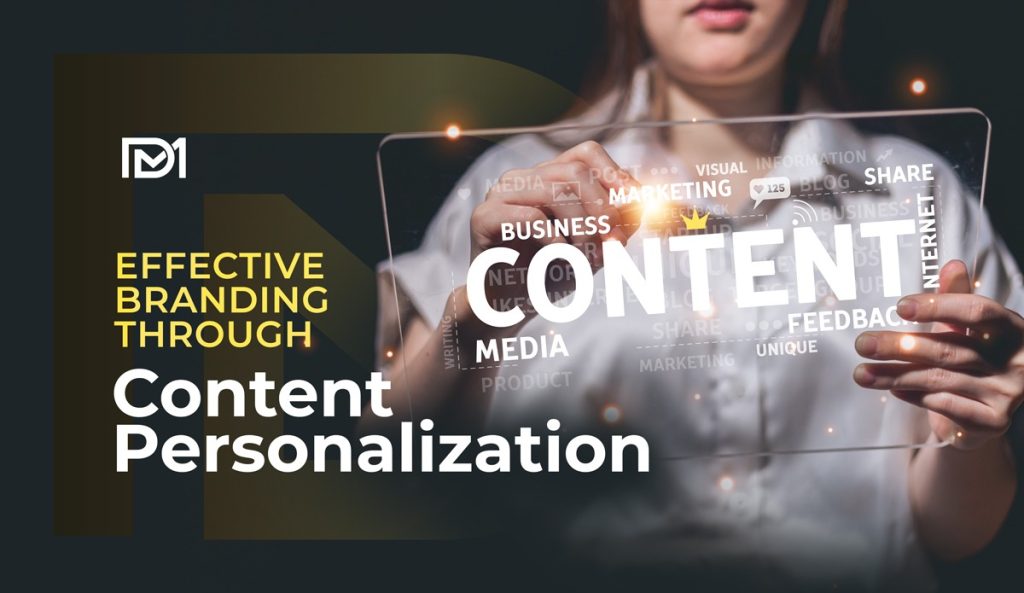In today’s fast-paced and hyperconnected digital landscape, standing out from the crowd and creating a lasting impression on your audience is more challenging than ever. Brands are constantly vying for the attention of consumers who are bombarded with information from all directions. In such a competitive environment, effective branding through content personalization has emerged as a game-changing strategy. This approach not only enhances customer engagement but also fosters brand loyalty by delivering tailored experiences. In this article, we’ll delve into the concept of content personalization, its benefits, and how it can help you build a stronger brand.
Understanding Content Personalization

Content personalization is the practice of tailoring your marketing materials, messaging, and user experiences to meet the unique preferences and needs of individual customers or audience segments. It involves using data and technology to create a more personalized and relevant interaction with your audience. Content personalization goes beyond addressing customers by their first name in an email – it encompasses a deeper understanding of their interests, behaviors, and context.
To effectively personalize content, brands rely on a variety of data sources, including website analytics, customer surveys, purchase history, and even real-time user behavior. By harnessing this data, brands can create highly targeted and individualized content that resonates with their audience on a personal level.
Benefits of Content Personalization for Branding

Enhanced Customer Engagement: Personalized content grabs the attention of your audience by speaking directly to their interests and needs. When customers feel that a brand understands them and caters to their preferences, they are more likely to engage with your content and stay connected to your brand.
Improved Customer Satisfaction: When customers receive content that aligns with their interests and needs, they are more likely to be satisfied with their overall experience. This boosts brand loyalty and increases the likelihood of repeat business and positive word-of-mouth marketing.
Increased Conversion Rates: Personalization often leads to higher conversion rates. By serving up the right content at the right time, brands can guide potential customers through the sales funnel more effectively, resulting in increased conversions and revenue.
Relevant Recommendations: E-commerce giants like Amazon have set the standard for personalized product recommendations. When customers see product recommendations based on their browsing and purchase history, they are more likely to make additional purchases. This not only increases sales but also strengthens the brand’s reputation for providing valuable suggestions.
Brand Consistency: Personalized content can be crafted to align with your brand’s identity and values, ensuring a consistent brand image across all personalized communications. This consistency reinforces brand recognition and trust.
Strategies for Effective Content Personalization

Data Collection and Analysis:
To personalize content, you need to gather data on your audience’s behaviors, preferences, and demographics. Tools like Google Analytics and customer relationship management (CRM) systems are essential for collecting and analyzing this data. Be sure to comply with data privacy regulations and obtain informed consent for data collection.
Segmentation:
Once you have collected data, segment your audience based on shared characteristics and behaviors. This segmentation allows you to create content that specifically targets these groups, increasing the relevance of your messaging.
Personalized Email Campaigns:
Email is a powerful medium for personalized content. You can use data to send targeted emails that cater to each recipient’s interests. Personalized subject lines, product recommendations, and exclusive offers can significantly improve email engagement.
Dynamic Website Content:
Use personalization to create dynamic website content that changes based on the user’s behavior. For example, an e-commerce site can display personalized product recommendations or content that aligns with a visitor’s browsing history.
AI-Powered Chatbots:
Implement AI-driven chatbots that can provide personalized recommendations and assistance to website visitors. These chatbots can analyze user input and provide relevant content and solutions.
Social Media Personalization:
Use social media algorithms and ad targeting options to create personalized social media content. This can include tailored ads, social posts, and messages that resonate with your audience.
Content Recommendation Engines:
Implement recommendation engines on your website or app. These engines analyze user behavior and suggest additional content or products that the user might find interesting. This approach keeps users engaged and encourages them to explore more of your offerings.
Feedback and Iteration:
Continuously collect feedback from your audience to refine your personalization efforts. Analyze the performance of personalized content and adjust your strategies as needed to improve engagement and conversions.
In today’s digital age, effective branding goes beyond logos and slogans. It’s about creating meaningful, personalized experiences that resonate with your audience on a personal level. Content personalization is a powerful strategy that allows brands to do just that. By leveraging data and technology, you can tailor your content to the unique preferences and needs of your audience, leading to enhanced engagement, customer satisfaction, and increased conversions. Implementing content personalization can help your brand stand out in a crowded marketplace and build lasting relationships with your customers. So, make the most of this powerful branding tool and watch your brand thrive in the age of personalization.
Ready to take your brand’s content personalization to the next level? Contact De Mellows today and transform your branding strategy. Don’t miss out on the opportunity to engage and connect with your audience on a deeper, more personal level. Reach out to De Mellows now for expert guidance and personalized solutions.
FAQ SECTION
1. What is content personalization?
Content personalization is the practice of tailoring marketing materials and user experiences to match the unique preferences and needs of individual customers or audience segments. It involves using data and technology to create more targeted and relevant interactions.
2. Why is content personalization important for branding?
Content personalization is essential for branding because it enhances customer engagement, satisfaction, and loyalty. When customers feel understood and receive content that aligns with their interests, they are more likely to connect with and trust your brand.
3. How do I collect data for content personalization?
To collect data for content personalization, you can use tools like Google Analytics, customer relationship management (CRM) systems, and customer surveys. Be sure to obtain informed consent and comply with data privacy regulations when collecting and using customer data.
4. What are some key strategies for effective content personalization?
Key strategies for effective content personalization include data collection and analysis, audience segmentation, personalized email campaigns, dynamic website content, AI-powered chatbots, social media personalization, content recommendation engines, and continuous feedback and iteration to refine your personalization efforts.

